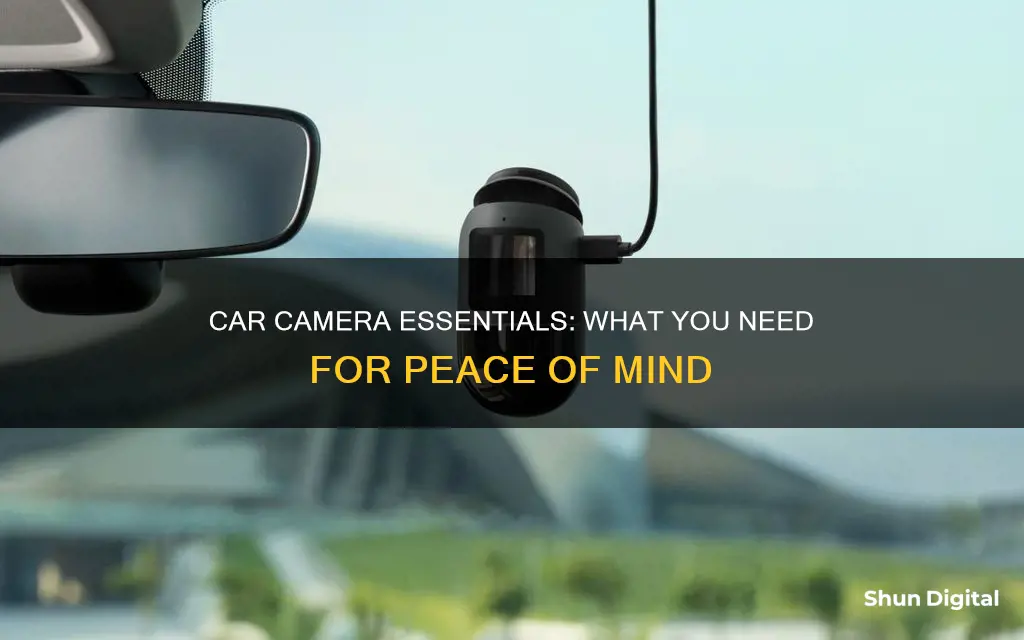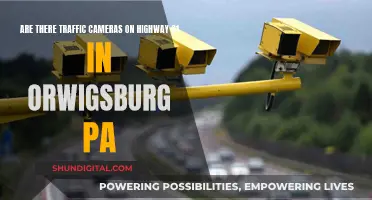
A dashboard camera, or dash cam, is a device that is mounted on a vehicle's dashboard or windshield and acts as a silent witness in the event of accidents or incidents. While some may think that a dash cam is unnecessary, it can be extremely useful and even save drivers money in the long run by helping them get out of hit-and-runs, vehicle accidents, and more. Additionally, dash cams can also be used to record footage when the vehicle is parked, which can help to deter thieves and burglars. When choosing a dash cam, it is important to consider the resolution, frame rate, autofocus, image stabilization, and other features such as GPS and Wi-Fi connectivity. While GoPros and smartphones can be used as dash cams, they may not have all the necessary features and can be more prone to overheating. Overall, a dash cam can provide drivers with peace of mind and help protect them in the event of an accident.
What You'll Learn
- Front-facing cameras are useful for recording accidents and hit-and-runs
- Cabin cameras are good for monitoring the interior of the vehicle, which is useful for taxi or rideshare drivers
- Dash cams with GPS can help you monitor the whereabouts of your vehicle in real-time
- Dash cams are useful for recording outside of your vehicle when it's parked
- Dash cams can help you dispute unfair driving tickets

Front-facing cameras are useful for recording accidents and hit-and-runs
Front-facing cameras are essential for recording accidents and hit-and-runs, providing valuable evidence for insurance claims and legal proceedings. They can also help prove your innocence in the event of a crash or dispute. When choosing a front-facing camera for your car, consider the following:
Video Quality
A higher resolution, such as 4K, will capture clearer and more detailed footage, making it easier to identify vehicles, licence plates, and other crucial details. This can be particularly useful in low-light or challenging conditions.
Field of View
A wider field of view allows the camera to capture more of the road and surrounding areas. Look for cameras with a field of view of at least 140 degrees, which provides adequate coverage without creating a distorted wide-angle effect.
Night Vision
Night vision or low-light performance is crucial for driving in dimly lit conditions or at night. Look for cameras with "night vision" modes or infrared capabilities to ensure legible and detailed footage, even in low-light environments.
Parking Mode
Parking mode enables the camera to record footage while your car is parked and unoccupied. This feature can be useful for monitoring your vehicle's surroundings and capturing any incidents that may occur when you're not driving.
Mounting Options
Consider the mounting options available for the front-facing camera. Lip mount cameras, for example, can be attached to the lip above the licence plate or other areas that jut out. Flush mount cameras are discreetly integrated into the vehicle's design without disrupting its aesthetics.
Additional Features
Some front-facing cameras offer advanced features such as GPS tracking, Wi-Fi connectivity, and impact detection. These features can provide additional benefits like location tracking, easy footage transfer, and automatic incident recording.
When installing a front-facing camera, ensure that it is securely mounted and positioned to capture a clear view of the road ahead without obstructing your field of vision. Additionally, familiarise yourself with local laws and regulations regarding the use of dash cams and the placement of cameras on vehicles.
The First Camera Image: A Historical Snapshot
You may want to see also

Cabin cameras are good for monitoring the interior of the vehicle, which is useful for taxi or rideshare drivers
Cabin cameras are a useful addition to your car, especially if you are a taxi or rideshare driver. They are a great way to monitor the interior of your vehicle and can provide peace of mind and an extra layer of protection.
Cabin cameras can be used in conjunction with front-facing dash cams to provide holistic surveillance of your vehicle. They are ideal for rideshare drivers as they can record both the driver and the passenger inside the cabin. This can be useful in the event of a dispute or if you need to provide evidence to the police or your insurance company. The footage can also help to protect you from false claims and prove your innocence in the event of an incident.
When choosing a cabin camera, it's important to consider the video quality, especially at night or in low-light conditions. Look for a camera with infrared LEDs that provide clear and crisp night-time recording. You should also consider the field of view, as you'll want to capture as much of the cabin as possible. A wide-angle lens will help to ensure that both the driver and passenger sides are visible.
Some cabin cameras offer additional features such as motion detection, parking surveillance, and voice control. You may also want to consider a camera with a microSD card slot to store your footage. This can be useful if you need to review an incident or provide footage to the police.
There are a variety of cabin cameras available on the market that offer these features, such as the BlackVue Taxi Dashcam, the Thinkware CABCAMIR Full HD IR Cabin Cam, and the Vantrue N2 Pro. These cameras offer high-definition recording, infrared night vision, and a wide field of view, making them ideal for monitoring the interior of your vehicle.
Ohio's Camera Tickets: Mail Delivery and Due Dates
You may want to see also

Dash cams with GPS can help you monitor the whereabouts of your vehicle in real-time
Dash cams with GPS are a great way to monitor your vehicle's whereabouts in real-time. This feature is especially useful for fleet managers who can ensure their drivers are taking the most optimal routes and can also help keep track of vehicle speed and location. GPS data can also be used to defend yourself from an unwarranted speeding ticket.
The GPS feature in dash cams works similarly to how it does on your phone, showing the location of your vehicle. Most dash cams have the GPS module built-in, while some budget-friendly models require an external GPS. The GPS data is stored along with the footage and can be viewed simultaneously on a map when playing back the video.
The GPS data can be used as evidence in the case of accidents, vandalism, or traffic violations. It can also help expedite insurance claims by providing details such as the time, date, speed, position, and direction of an accident. For parents and guardians, GPS can be used to monitor the speed and location of young or inexperienced drivers.
Additionally, dash cams with GPS can also provide advanced driver assistance systems (ADAS) such as lane departure and forward collision warnings. This makes it a useful tool for driving instructors as well.
Overall, dash cams with GPS provide valuable information that can be used for a variety of purposes, making it a worthwhile investment for vehicle owners.
Plugging Your Camera: Computer Ports and Compatibility
You may want to see also

Dash cams are useful for recording outside of your vehicle when it's parked
Parking mode is only available if your dash camera is hardwired to your vehicle's battery. Dash cams that are plugged into the 12V accessory outlet (cigarette lighter adapter) or OBD-II ports generally do not remain powered when the vehicle's engine is off. So, if you want to use parking mode, you'll need to get your dash cam professionally installed and hardwired to your vehicle.
There are a few different types of parking mode:
- Motion detection mode: The camera starts recording when it detects any movement around the car.
- Impact detection mode: Sensors detect any impact or collision with the car. This is the most effective way to ensure incidents are captured.
- Eco parking mode: Only available on certain models, this mode uses a radar sensor instead of the camera's image sensor, resulting in a 90% reduction in current draw from your battery.
You may also want to consider getting a dash cam with programmable voltage thresholds, which will automatically shut the camera off if your vehicle's battery is dying. This will give you peace of mind that your dash cam won't completely drain your vehicle's battery.
The Making of the First Kodak Camera
You may want to see also

Dash cams can help you dispute unfair driving tickets
Dash cams are an effective tool to protect yourself from wrongful traffic tickets. They can provide invaluable video evidence to contest a ticket in court. For example, a Tesla owner was pulled over for not signalling while turning, but his dash cam footage proved his innocence and helped him avoid a $171 fine. Similarly, an Uber driver was able to prove that he had stopped at a red light, contrary to what the police officer claimed.
In addition to helping with traffic tickets, dash cams can also be useful in the event of an accident, a hit-and-run incident, or police misconduct. They can also monitor unsafe road conditions or the driving habits of another person in your car.
When choosing a dash cam, look for features such as 4K resolution, night vision, high dynamic range (HDR), 24-hour parked-car monitoring, a wide field of view, and a supercapacitor power supply instead of a lithium-ion battery. Some dash cams also offer additional cameras for rear and interior coverage, GPS tracking, and Wi-Fi and smartphone apps for downloading and sharing footage.
While dash cams can be a great way to protect yourself, it's important to note that they can also document your own mistakes. It's always best to consult a lawyer before submitting any footage as evidence. Additionally, be sure to familiarise yourself with your local laws regarding the use of dash cams and the admissibility of footage in court.
Cameras of 1912: A Historical Snapshot
You may want to see also
Frequently asked questions
A car camera can provide an objective eyewitness to an accident or other incident you’re involved in. It can also record a crash, a hit-and-run, or police misconduct that has occurred in your vicinity.
The laws on car cameras are decided at the state level, so you need to confirm whether they’re safe to use where you live, and familiarize yourself with local audio- and video-recording laws.
Car cameras are small cameras that mount to your dashboard and continuously record video, usually to a microSD card. For power, car cameras can draw from the car's 12 V DC outlet (also known as a cigarette lighter) or a power bank, or they can connect directly to the car’s fuse box (the latter is best if you need continuous power to record even when the car is parked and the engine is off).
Loop recording allows car cameras to continuously record video footage to their built-in storage or memory card. The setting automatically overwrites the oldest clips on your camera with new ones when its storage becomes full.
Some good car cameras include the Miofive S1 Ultra, the Viofo A229 Pro, the Garmin Dash Cam Mini 2, the Nextbase iQ Smart Dash Cam, and the BlackVue DR970X-2CH Plus.







